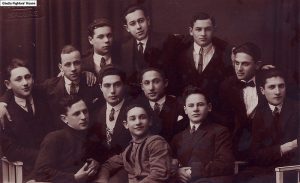Aharon Pertsikovitz Peretz
 Aharon Pertsikovitz (Peretz) was born on January 2, 1910 in the Lithuanian town of Butrimonys in the Vilna region what was then part of the Russian Empire (now the Aytus district of Lithuania), the son of Bezalel and Rosa (née Romanov) Pertsikovitz. He studied at the Hebrew Real Gymnasium in Kovno, and upon graduation in 1927, he began studying medicine at the Lithuanian University in the city, where he was awarded a doctorate in 1933.He practiced medicine and specialized in gynecology at the Bikur Cholim Jewish Hospital in Kovno until the Nazi German invasion of Lithuania.
Aharon Pertsikovitz (Peretz) was born on January 2, 1910 in the Lithuanian town of Butrimonys in the Vilna region what was then part of the Russian Empire (now the Aytus district of Lithuania), the son of Bezalel and Rosa (née Romanov) Pertsikovitz. He studied at the Hebrew Real Gymnasium in Kovno, and upon graduation in 1927, he began studying medicine at the Lithuanian University in the city, where he was awarded a doctorate in 1933.He practiced medicine and specialized in gynecology at the Bikur Cholim Jewish Hospital in Kovno until the Nazi German invasion of Lithuania.
In August 1941, he was restricted with his wife Raya (a dentist by profession) and his only son Alek (who was then six years old) to the Kovno Ghetto, where he worked as a forced laborer and ran a gynecology department; however, he devoted most of his time to providing medical care to pregnant women. In July 1942, the Nazi authorities issued an ordinance published throughout the ghetto that starting from September every pregnant woman in the ghetto who did not terminate her pregnancy would be killed along with her newborn, as well as anyone who assisted in the pregnancy and childbirth. However, there were brave women who did not accept the evil decree and whose sense of motherhood, outweighing the danger of death, rebelled and continued their pregnancy in underground conditions and with terrible suffering. These women would call Dr. Peretz when the pregnancy worsened or when labor pains endangered their lives. During those fateful hours, he stood by them, identifying with their suffering at the risk of his own life.
When the ghetto was liquidated in the summer of 1944, he and his wife were transferred to the Stutthof concentration camp, and after a few days were separated. He was transferred from camp to camp and arrived at the Dachau concentration camp, where he served in his profession as he did in the ghetto. In April 1945, Dachau was liberated by the US Army. His son, who was secretly removed from the ghetto in the period following the "Kinder Aktion " (held in late March 1944) and placed under the care of a Lithuanian woman, was released by the Russians. His wife was released by the English after being moved from camp to camp and from a burning ship in the middle of the sea.
Immediately after the end of the war, he searched for his wife and small son, but when he was told his son had left with other war orphans for Eretz Israel, he quickly followed him and made aliyah to Eretz Israel in September 1945, only to learn, to his disappointment, that he had preceded his son. His son Alek made aliyah to Eretz Israel in October 1945 from Romania, traveling on the ship "Pennsylvania" that carried a thousand orphans as part of youth aliyah, without knowing that his father expected him. In April 1946, his wife Raya also arrived.
During the War of Independence, he served as a medical officer. In 1949, he was transferred to the Government Hospital in Haifa (later Rambam Hospital) where he founded the Obstetrics & Gynecology Department and was appointed its director. He served as a full professor at the School of Medicine.
In 1961, he testified concerning the Aktions in the Kovno Ghetto at the Eichmann trial, where the Jews of Lithuania were exterminated, including the Aktion on October 28, 1941, in which 10,000 people were taken to the Ninth Fort in one day, and the "Kinder Aktion" at the end of March 1944, during which one thousand three hundred children were taken from their parents (with the aim of clearing the ghetto of children) with extreme cruelty and later exterminated. This is how Dr. Peretz described the "Kinder Aktion":
"They threw the children into the truck. The mothers shouted desperately. One of them shouted in the face of a German: 'Give me back my children!' 'How many of them are your children?" asked the SS officer "Three," the woman replied. "Then we'll give you back one of them," said the SS officer. The woman got into the car and her three small children looked up at her. Each of them, of course, wanted to go back to his mother; she was unable to decide which one to take. After a long moment, she returned empty-handed."
He published around 70 works in the field of gynecology and obstetrics. He was awarded an honorary certificate and a medal from the Faculty of Medicine in Haifa and an honorary certificate from the Israel Gynecologists Association.
Prof. Aharon Peretz died in Haifa on April 11, 1989, and was buried in the Kfar Samir cemetery in the city.
His son Dr. Alek Bezalel Peretz is a gynecologist.
From: Wikipedia

